Crypto Scam Prevention Tips
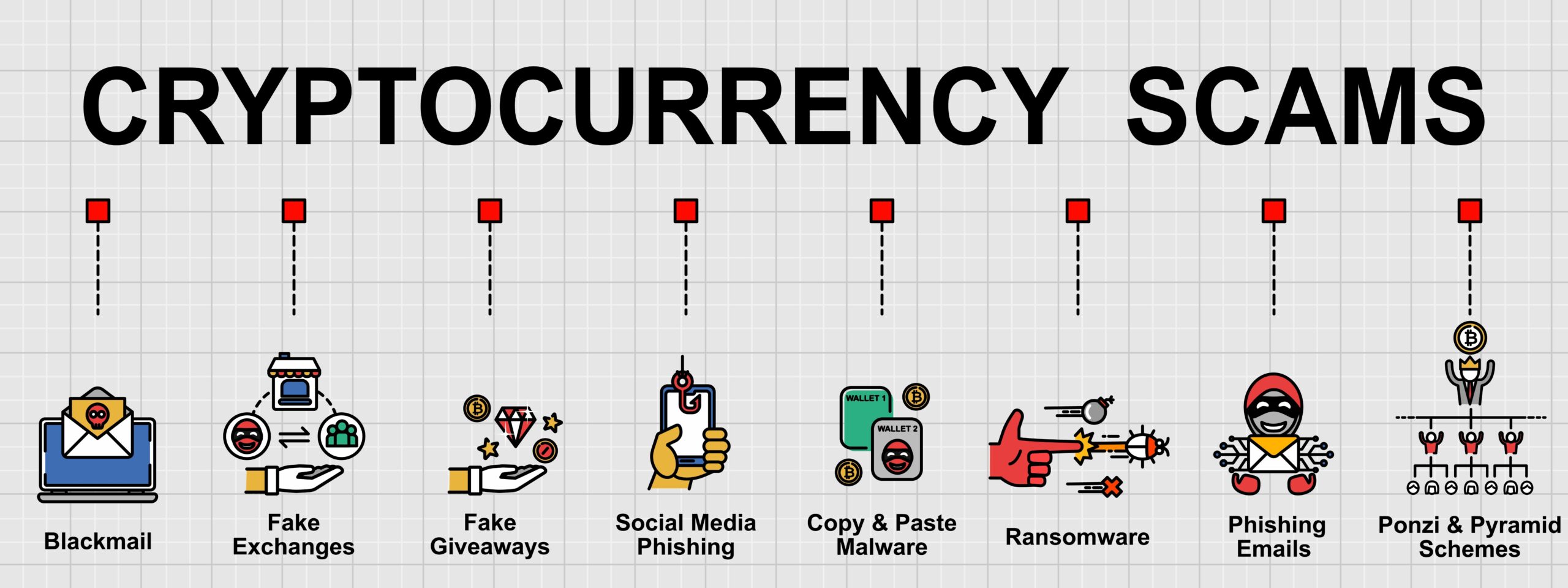
Ever wondered how to keep your cryptocurrencies safe from scams? With the rise of sophisticated scamming tactics, navigating the crypto world can be tricky. But fear not. This article arms you with critical steps to protect your assets and avoid falling for scams. Scammers are becoming craftier as more people enter the crypto space. The allure of high returns and anonymous transactions often masks the traps they set. Recognizing red flags like unsolicited offers, urgent pressure to act, and promises of guaranteed returns can keep you secure. Falling victim to these scams isn’t just a financial hit; it can devastate your emotional well-being too. Imagine losing your hard-earned savings in moments—that scenario is all too real for many. Ready to outsmart these threats and safeguard your investments? Stay tuned for practical tips to stay one step ahead and keep your crypto safe.
Crypto Scam Prevention Tips: Stay One Step Ahead
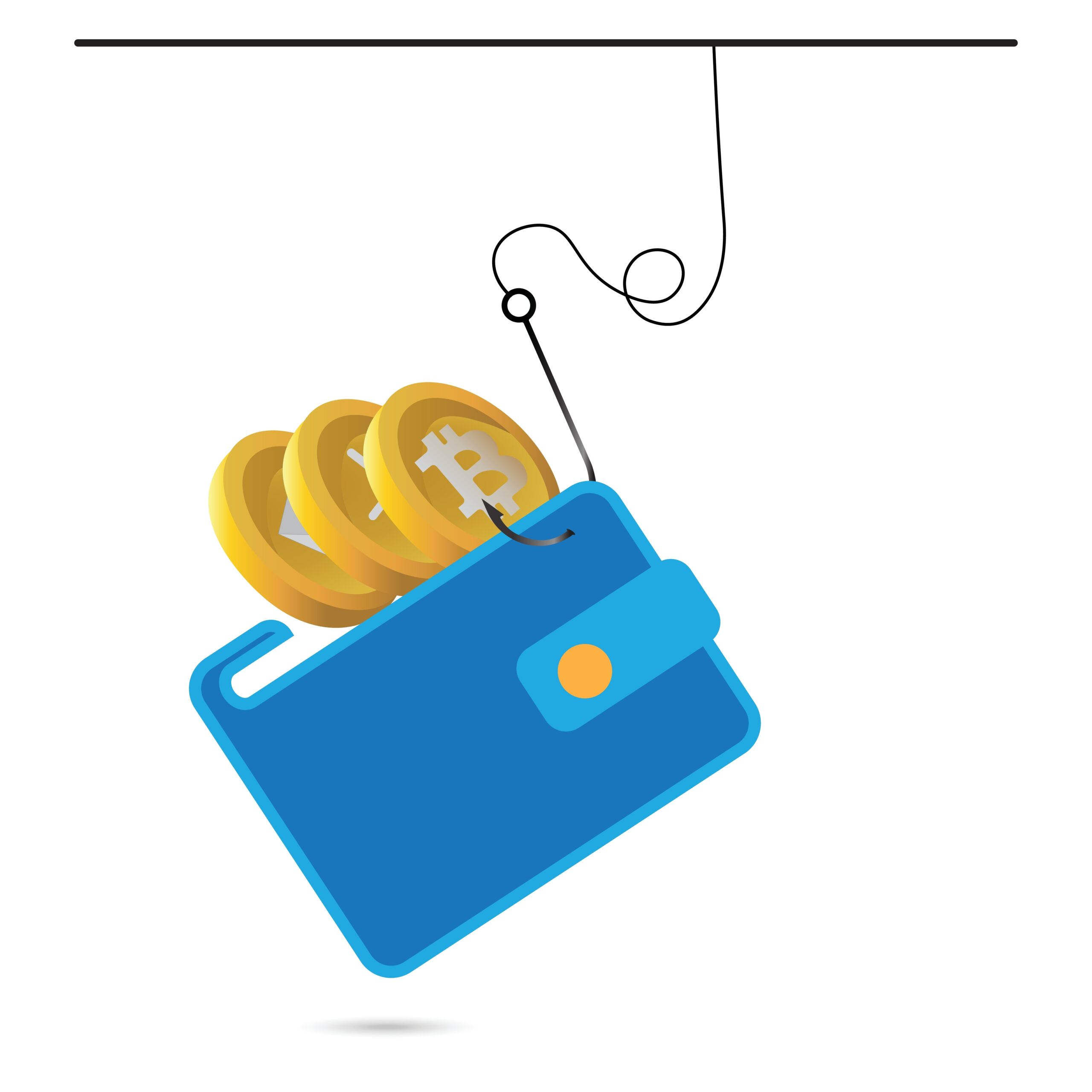
Ever wondered how to keep your cryptocurrencies safe from scams? In today’s world, scamming tactics have become more sophisticated, and it’s essential to stay ahead. By the end of this article, you’ll know the critical steps to take to protect your crypto assets and avoid falling victim to scams.
The Problems with Crypto Scams
Let’s face it, the world of cryptocurrency isn’t all rainbows and moonshots. The rapid growth of the crypto industry has unfortunately also led to a surge in scams. Understanding the common issues and pitfalls people encounter can help you navigate this space more safely.
Growing Threat of Scams
Crypto scams are on the rise, and for good reason. As more people get involved in cryptocurrency, the opportunity for scammers increases. According to the Federal Trade Commission, crypto scams caused losses of over $80 million in the first quarter of 2021 alone. These scams range from elaborate Ponzi schemes to simple phishing attacks.
But why are they becoming more prevalent?
- Increased Adoption: More people are investing in crypto, making it a bigger target.
- Lack of Regulation: The decentralized nature of crypto makes it harder to regulate, creating more opportunities for scammers.
- Anonymous Transactions: The pseudonymous nature of many cryptocurrencies makes it easier for scammers to hide their tracks.
Identifying the Red Flags
So, how can you identify when something might be a scam? Here are some key indicators:
- Unsolicited Offers: If you’re being offered an amazing deal out of the blue, it’s likely too good to be true.
- Pressure to Act Quickly: Scammers often create a sense of urgency to prevent you from having time to think things through.
- Promises of High Returns: If it sounds too good to be true, it probably is. Genuine investments won’t guarantee high returns with no risk.
- Strange Email Addresses or Contact Information: Always verify the source of any communication related to your crypto assets.
The Impact of Being Scammed
The consequences of falling for a crypto scam can be devastating. Once you’ve sent your crypto to a scammer, it’s almost impossible to get it back. The financial loss can be significant, but the emotional toll can be just as severe.
Imagine losing your hard-earned savings in a matter of minutes. It’s a bitter pill to swallow. According to a study by the Australian Competition and Consumer Commission, individuals lost over $25 million to cryptocurrency scams in 2019 alone. These losses are not just financial but also impact your sense of security and trust in the crypto space.
Curious about how you can take concrete steps to protect your investments? In the next part, we’ll discuss one of the most crucial aspects: protecting your keys. Stay tuned, and keep your assets safe!
Protect Your Keys
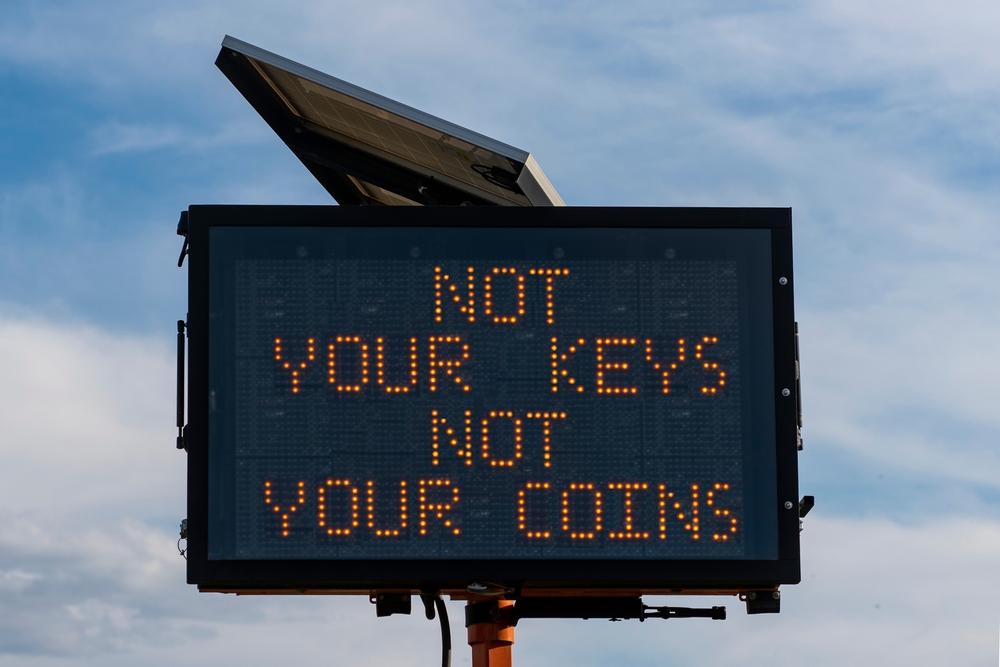
Your private keys are the gateways to your crypto assets. Think of them as the keys to a vault filled with gold. If someone else gets hold of them, it’s game over. Let’s explore the essential steps to keep your keys—and your cryptocurrency—safe.
It’s straightforward: never share your private keys with anyone. Period. Even if you receive an email or message claiming to be from a reputable source, do not give them your private keys. Scammers are getting incredibly sophisticated, using phishing tactics to get you to reveal this critical information.
- Real Example: A user on Reddit shared how they lost thousands of dollars worth of Bitcoin after falling for a fake giveaway. The scammer asked for their private keys to ‘verify’ their wallet. Remember, no legitimate company will ever ask for your private keys.
Use Hardware Wallets
Storing your cryptocurrency in a hardware wallet is one of the safest ways to protect your assets. Hardware wallets are offline devices that hold your private keys. They are immune to online hacking attempts, reducing the risk significantly.
- According to a report from CipherTrace, those who used hardware wallets faced significantly fewer instances of theft compared to those using purely online wallets.
So, if you’re serious about your investments, consider buying a reputable hardware wallet like Ledger Nano S or Trezor.
Verify Before Transacting
Before sending your hard-earned crypto, verify the recipient’s wallet. One foolproof method is sending a small amount first. If the transaction goes through without any hitches, you can proceed with the full amount.
- This might sound time-consuming, but it’s a small price to pay for peace of mind. A few dollars as a test run can save you thousands down the line.
“An ounce of prevention is worth a pound of cure.” — Benjamin Franklin
Keeping your private keys secure, using a hardware wallet, and verifying transactions might seem like small steps, but they are crucial in safeguarding your crypto assets. With scams becoming more prevalent, these actions can be your first line of defense in this digital Wild West.
Are you ready to take things a notch further? In the next section, we’ll get into recognizing phishing scams and how to avoid them. Trust me, you won’t want to miss it!
Spotting Phishing Scams
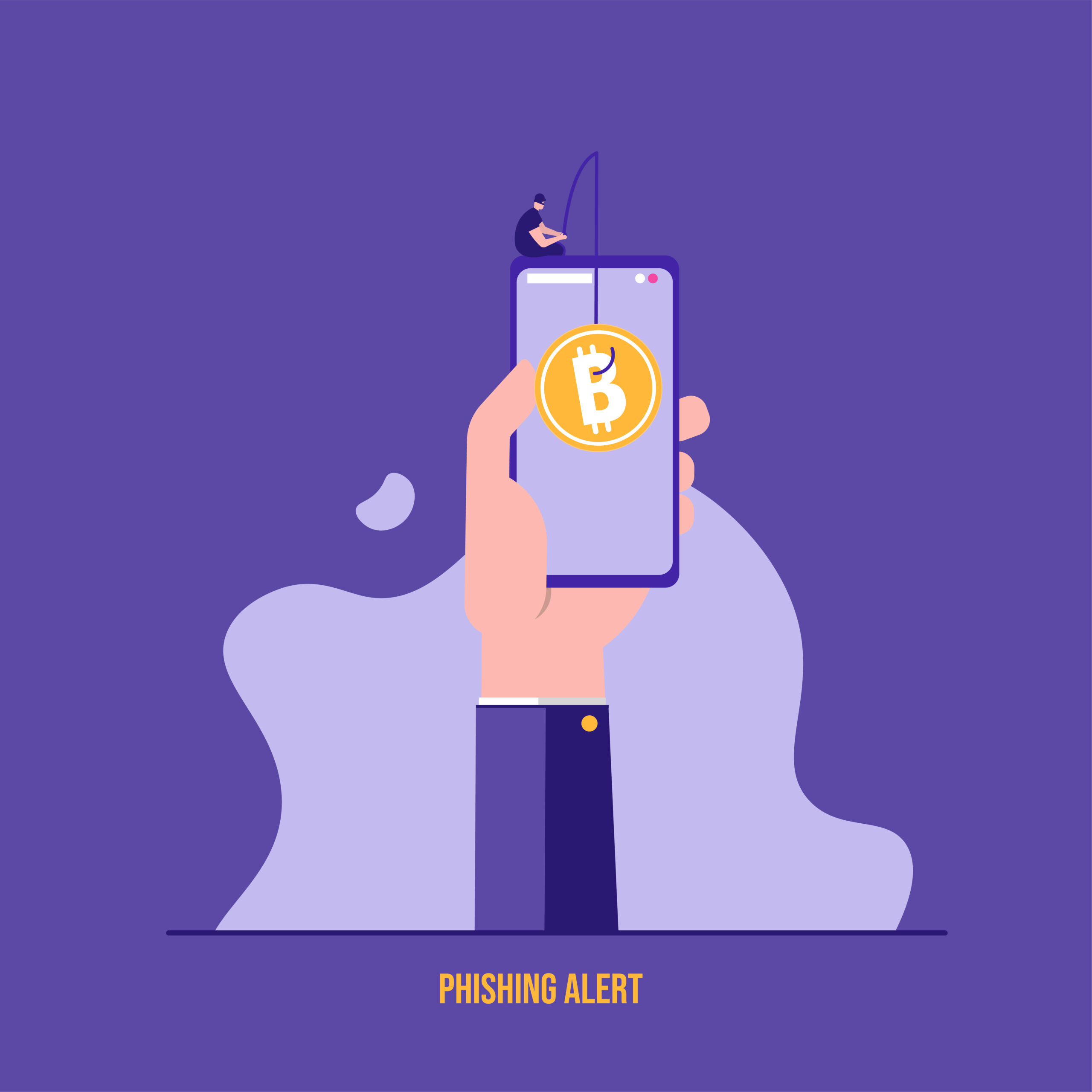
In the wild world of cryptocurrency, phishing scams are lurking around every corner, waiting to snatch your hard-earned digital assets. Knowing how to recognize these scams is essential for staying safe.
Fake Websites and Emails
Imagine getting an email that looks exactly like it came from Binance or Coinbase. The logo’s right, the colors match, but something feels off. Be cautious because these fake emails are designed to trick you into sharing sensitive information.
- Check the URL: Legitimate cryptocurrency sites will always use HTTPS and have domains that you recognize. If you get an email, don’t click on the link. Instead, go directly to the website by typing in the URL yourself.
- Watch for spelling errors: These fake websites often contain minor spelling mistakes or unusual language.
“Phishing attacks accounted for nearly a quarter of all inbound email weaponization in 2021.” — Verizon Data Breach Investigations Report
Suspicious Links
Clicking on unsolicited links is like opening Pandora’s box. You never know what might happen next. If you receive an unexpected message asking you to click a link, think twice.
- Hover Over Links: Before clicking, hover over the link to see where it leads. If it’s a shortened URL or looks strange, avoid it.
- Don’t Download Attachments: Unless you’re 100% sure of the source, avoid downloading any attachments. These could be riddled with malware.
One common tactic is creating urgency. Messages that say things like “Immediate action required!” or “Your account will be suspended!” are designed to make you act without thinking. Keep calm and verify the source before doing anything.
Email and Communication Best Practices
The way you handle your emails and communications can make all the difference in staying safe from phishing scams.
- Enable Two-Factor Authentication (2FA): Adding an extra layer of security helps protect your account, even if someone does get ahold of your password.
- Use a Separate Email for Crypto: Consider creating a new email address specifically for your cryptocurrency activities. This way, you can easily spot unrelated or suspicious emails.
- Educate Yourself and Your Peers: The more you know, the better equipped you are to fend off phishing attempts. Share this knowledge with friends and family who are also in the crypto space.
Ever wondered what other types of scams are out there, waiting to catch you unprepared? Stay tuned, because next, we will explore the common scams in the crypto world and how to identify them.
Recognize Common Scams
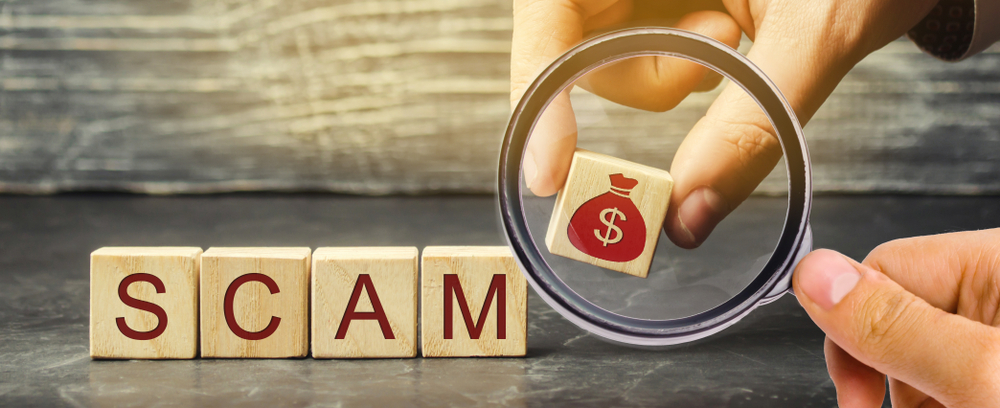
Understanding the common scams in the cryptocurrency space is crucial for every investor. By being aware of these tactics, you can safeguard your assets and make informed decisions. Let’s take a look at some of the most prevalent scams out there.
Ponzi Schemes
Ponzi schemes aren’t new, but they’ve adapted to the digital age. These scams promise high returns with little risk to lure investors. Initially, they might pay returns to early investors from new investors’ funds, creating the illusion of a profitable investment.
Look out for:
- Guaranteed returns: No legitimate investment can guarantee profits.
- Complex strategies: Scams often use jargon and complicated strategies that aren’t transparent.
- Vague details: If you can’t get clear answers, it’s a red flag.
Remember Bernie Madoff’s infamous case? He ran one of the largest Ponzi schemes in history, swindling billions. The lack of transparency and the unrealistic returns were key indicators. Don’t fall for the same mistakes.
Fake Investment Opportunities
Scammers often create fake investment platforms that look too good to be true. They promise significant gains in a short amount of time and use polished websites and fake testimonials to lure you in.
Protect yourself by:
- Researching the company: Look for reviews, check their regulatory status, and verify their contact information.
- Examining testimonials: Be wary of overly positive reviews that seem scripted or generic.
- Being skeptical of social media ads: These are often a breeding ground for fake opportunities.
Always remember Warren Buffet’s words: “If something sounds too good to be true, it probably is.”
Social Engineering
Social engineering is a psychological manipulation technique scammers use to trick victims into giving away confidential information. This could be through phishing emails, fake phone calls, or even SMS messages.
How to spot it:
- Urgency: Scammers create a sense of urgency to force you into making quick decisions.
- Emotional appeal: They might play on your emotions, like fear or excitement, to make you act irrationally.
- Unusual requests: Be cautious if they ask for personal information or request you to click on suspicious links.
An emotional plea saying your account is compromised can be very persuasive. But always verify through official channels before taking action. Trust in your own caution over instinctive urgency.
These are just a few of the numerous scams out there, each designed to trick you into parting with your hard-earned cryptocurrencies. But what do you do if you happen to fall victim? Stay tuned because in the next section, we’ll explore how to recover from a scam and what steps you need to take immediately.
Recovering from Scams

Let’s talk about something no one wants to face but everyone must be prepared for – recovering from crypto scams. If you’ve fallen victim to a scam, it’s not the end of the road. There are steps you can take to try and recover your losses and protect yourself moving forward.
Reporting to Authorities
The first step you should take is to report the scam to authorities. It’s crucial to document everything related to the incident. This includes:
- Transaction IDs
- Conversations and communications
- Screenshots of websites or emails
Authorities such as IC3 (Internet Crime Complaint Center) and local law enforcement agencies are key resources. While it may seem daunting to report such incidents, your report can help authorities track patterns and, in some cases, recover funds. As Franklin D. Roosevelt once said,
“The only thing we have to fear is fear itself.”
Moving forward and taking action is far better than staying silent.
Tracing and Recovering Funds
Tracing and recovering fraudulent funds can be complex, primarily due to the anonymous nature of cryptocurrency transactions. However, it’s not impossible. Some methods include:
- Contacting your exchange if the scams occurred on a centralized platform. They may have protocols for handling such incidents.
- Employing blockchain analysis tools. Services like Chainalysis provide in-depth tracing of blockchain transactions.
Realistically, please note that recovery isn’t guaranteed. It’s like trying to find a needle in a haystack. However, the effort is worth it, and success rates are slowly improving as technology advances and law enforcement agencies get more crypto-savvy.
If you’ve been scammed, don’t lose hope. There are steps you can take, and resources are growing every day to help victims. But what about preventing scams in the first place? Up next, we’ll explore some vital tools and resources that can arm you against potential threats. Ready to dive deeper?
Tools and Resources
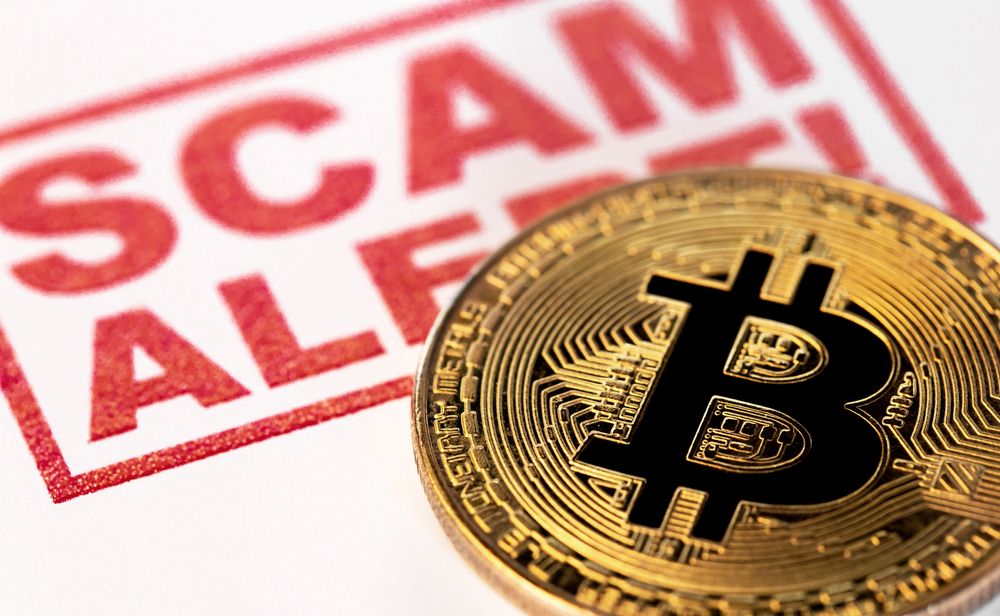
Keeping your cryptocurrencies safe is an ongoing process, and utilizing the right tools and resources can make all the difference. Let’s explore some highly recommended readings, monitoring services, and community support options.
Recommended Readings
Staying updated with the latest information about crypto scams is crucial. Here are some resources to check out:
- FTC’s Cryptocurrency Scam Guide – Understand the basics of how scams work and learn about the latest scam tactics.
- Investopedia’s Bitcoin Scams Guide – Get insights into common Bitcoin scams and how to avoid them.
- Unit21’s Blog on Crypto Fraud – Stay informed about various types of crypto fraud and protective measures.
Monitoring Services
There are tools available that can help you monitor your crypto transactions and offer some level of security. Consider looking into:
- Alert Services: Some platforms offer alert services that notify you of any suspicious activities in your accounts.
- Portfolio Trackers: Applications like Blockfolio and Delta can help you keep a close eye on your investments.
- Security Software: Ensure you have good security software to protect your devices from malware and phishing attacks.
Community Support
Being part of a knowledgeable community can provide you with updates, support, and warnings about potential threats. Some steps to consider:
- Join Forums: Participate in crypto forums like Reddit’s r/cryptocurrency for the latest discussions and tips.
- Attend Meetups: Look for local cryptocurrency meetups where you can network and learn from others.
- Follow Influencers: Stay current by following credible crypto influencers and analysts on social media platforms.
Can you really afford not to take advantage of these tools and resources? Knowing what to use and where to get the best information can save you a lot of stress and potential loss. So, what’s next in your quest to safeguard your crypto investments? Let’s discuss the importance of staying vigilant and why it’s crucial in our ever-evolving digital world.
Staying Vigilant

In the ever-evolving world of cryptocurrencies, staying vigilant isn’t just a recommendation—it’s a necessity. Scammers are constantly coming up with new tactics, so your first line of defense is to be consistently aware and cautious. Let’s explore the key strategies to stay one step ahead.
Regularly Update Knowledge
The crypto world changes at lightning speed. New coins, platforms, and security measures pop up all the time. Keeping your knowledge up to date isn’t just smart—it’s crucial. Consider subscribing to reputable crypto news sites and forums. For instance, sites like Cryptolinks offer a plethora of resources for staying informed.
Studies show that cybersecurity threats in the crypto space double each year. Being informed about new types of scams and security practices makes these threats easier to handle. If you hear about a new scam or security breach, check multiple sources to ensure you’re getting accurate information. Knowledge is your armor in this unpredictable space.
Trust Your Instincts
That gut feeling you get when something feels off? Trust it. Many scams can be avoided if you listen to your instincts. If something seems too good to be true, it probably is. Scammers often prey on our hopes and fears, creating offers that are hard to resist.
For example, if you’re approached with an “exclusive” investment opportunity that guarantees double your return in just a few weeks, let your skepticism kick in. Real investments don’t come with no-risk guarantees. Always do your research and, if needed, consult with trusted community members or professional advisors.
Take Away
In summary, staying vigilant can be boiled down to three main points:
- Keep Learning: Regularly update yourself with the latest news and security practices.
- Trust Your Instincts: If something feels too good to be true, it probably is.
- Be Proactive: Taking small, proactive steps can save you a lot of trouble.
By remaining informed and cautious, you can navigate the crypto landscape with greater confidence and security. Remember, the best way to protect your assets is to stay ahead of those who seek to steal them.
Ready to explore more about how to keep your crypto safe? Check out our other resources and take the first step towards a more secure crypto experience.
Bonus Top 10 Crypto Scam Prevention Tips
Understanding the Threats
When it comes to crypto, the landscape is filled with hackers and scam artists. Whether it’s fake websites or phishing scams, the dangers are real. Let’s break down the common threats lurking around every corner.
Recognizing Red Flags
I’ll guide you on how to spot warning signs like fake celebrity endorsements or dodgy emails that ask for personal info. These are often the traps scammers set, and knowing them is half the battle.
- Fake Websites: You might occasionally come across websites that look just like the real deal but are actually set up to steal your information. Always double-check the URL and look for subtle misspellings or unusual domain extensions.
- Phishing Scams: Imagine getting an email that seems to be from your wallet or exchange, asking you to confirm your password. Sounds legitimate? Well, it’s a classic trick to grab your credentials. Always verify through official channels before taking any action.
- Pump and Dump Schemes: Beware of groups rallying around a coin, promising huge returns quickly. They often disappear after the price is artificially inflated.
Each of these threats can seem daunting, but remember, knowledge is your first line of defense. As we go further, you’ll see how these pieces fit into the larger puzzle of keeping your digital wealth secure.
Ready to dive deeper into protecting your crypto wallet from being a target? Well, the next section is packed with insights you won’t want to miss. Stay tuned!
Protecting Your Wallet
Your crypto wallet is like your real wallet; keep it safe. Let’s make sure it’s secure from unwanted access. The right strategies will help you protect your digital fortune effectively.
Use Hardware Wallets
Hardware wallets are your first line of defense. These wallets store your keys offline, putting up a tough barrier against online threats. Think of them as a vault for your investment, where nothing can harm your precious assets if not connected to the internet. According to a study by Ledger, hardware wallets are significantly more secure than software wallets due to their offline nature. Trust me, this simple shift can save you from a world of headaches.
Implement Strong Passwords
Strong passwords are vital. Create unique passwords that are tough to crack by using a mix of letters, numbers, and symbols. Password managers can be a lifesaver, helping you generate and store these complex passwords securely.
Furthermore, two-factor authentication is non-negotiable—it’s like adding a second lock to your door. A Google study found that two-factor authentication can block 99.9% of automated attacks. So, are you ready to take that extra step for some peace of mind?
Keep Software Up-to-Date
Don’t overlook updates. I can’t stress enough how important it is to keep your wallet and software updated. Updates patch up potential security loopholes, making life a lot harder for scammers. Hackers often exploit outdated systems, so ensure you’re always one step ahead.
So, how often do you check for updates—the lifeline that keeps your crypto safe?
Protecting your digital wallet is key, but is that all you need to safeguard your crypto investments? Up next: how staying informed can keep the bad guys at bay. Let’s discover those secrets together!
Staying Informed
Knowledge is power, especially when it comes to avoiding scams. In the world of crypto, new threats pop up faster than you can say “blockchain.” That’s why staying informed is key to protecting your investments.
Follow Trusted Sources
First things first—where are you getting your information about cryptocurrency? It’s wild out there, with a ton of misleading headlines and shady “experts” lurking around. Here’s what you need to do:
- Stick to established crypto news outlets: Look for sites with a track record and solid reputation. Places like CoinDesk and The Block can be good starting points.
- Be cautious on social media: Many accounts pose as gurus but could be completely unreliable. Double-check against trusted sources.
- Fact-check everything: It’s easy to be swayed by sensational info. Cross-reference news from multiple sources.
Remember the quote, “In the age of information, ignorance is a choice.” Make sure you choose wisely.
Join Online Communities
Ever heard the saying, “There’s strength in numbers”? Joining online crypto communities, like forums or Reddit groups, is a fantastic way to stay informed. These groups often catch wind of scams faster than individual outlets. Here’s why they’re crucial:
- Real-time updates: Fellow enthusiasts often share news and alerts immediately.
- Diverse viewpoints: A wide array of opinions can broaden your understanding of unfolding events.
- Support systems: Engaging with a group can provide reassurance and guidance if you’re unsure about a piece of info.
Stay Up on Current Scams
Knowing about current scams can be your best defense. Scammers are innovative and always look for the next big score. Here’s how you can stay a step ahead:
- Subscribe to scam alert updates: Websites like the FTC and FBI often release info on new scams.
- Set up Google alerts: Use specific keywords related to crypto scams so you receive alerts straight to your inbox.
- Always cross-check with community discussions to see if others have encountered similar issues.
Your ability to stay informed might just save you from falling into a scammer’s trap. But what happens if, despite your best efforts, you still find yourself caught in a scam? Don’t worry. We’ll tackle that next as we explore actionable steps you can take to recover and regroup.
Knowing How to Act if Scammed
It happened. You got caught in a scam. First things first: don’t panic; you’re not alone, and there are steps you can take to mitigate the damage. Let’s explore what you need to do to tackle this.
Reporting the Scam
Reporting is your first line of defense. It’s crucial for not just stopping the scammer but also preventing others from falling into the same trap. Who do you report to? Start with local and national authorities such as the police or cybercrime units. Many countries have specific agencies for cyber threats, so be sure to reach out to them.
Additionally, report the scam to the platform or exchange where the scam occurred. This is crucial because they can take steps to block the scammer’s accounts.
Reaching Out for Help
Once you’ve got the authorities involved, don’t hesitate to seek additional support. There are numerous online communities where you can find advice and support from others who’ve been in your shoes. Websites like Cryptolinks News often feature user stories that can provide guidance and assurance.
Consider consulting with a professional experienced in crypto scams for legal advice, depending on the severity of your loss.
Every challenge offers a lesson. Use this experience to make yourself stronger and more aware. Share your story on forums—like Reddit, specialized groups on Telegram, or even through dedicated crypto scam reporting sites. By sharing what you went through, you might just save someone else from enduring the same ordeal.
Now that you’re armed with the know-how to confront a scam, are you ready to enhance your security mindset so you’ll be ahead of any issues in the future? Stay tuned as we move forward to fortify our defenses further in the next part!
Enhancing Your Security Mindset
Alright, friends, let’s tie it all together by focusing on the mindset needed to outsmart those pesky scammers. By understanding the risks and actively tackling them, you’ll be way ahead of the game.
Consistent Vigilance
First up, being consistently vigilant is absolutely essential. Scammers are always refining their tactics, so it’s important to stay alert. This doesn’t mean living in fear, but it does mean keeping your digital senses sharp. According to a study from the Journal of Cybersecurity, awareness can significantly reduce the likelihood of falling prey to scams. So, keep your guard up and eyes open for any suspicious activity.
Practice Makes Perfect
Just like anything else in life, practice is key. Regularly revisiting your security practices ensures you’re always a step ahead. Does your multi-factor authentication set-up still serve you well? Could your passwords use a refresh? Make it a habit to evaluate and tweak these details every so often. Remember, adapting is surviving. Pick a day every month or so to do this. Trust me, you’ll thank yourself later.
Staying Positive
Finally, let’s not underestimate the power of a positive mindset. Yes, the world of crypto can feel overwhelming, but each step you take towards security is one more layer of armor protecting your investments. Stay motivated, and don’t let fear dictate your decisions. There’s a community out there—us included—that’s rooting for you to succeed. A study from the Harvard Business Review illustrates that a positive outlook aids in better decision-making. So, keep that chin up, and focus on continually strengthening your defenses.
Stay Safe and Invest Smart
And there you have it! This journey we’ve taken together has equipped you with the tools and mindset needed to safeguard your assets. Keep ingesting new information, strengthen your security games, and be an active and smart investor. Thanks for joining me on this adventure. Stay informed, stay secure, and here’s to your success in the crypto world. Happy investing!
